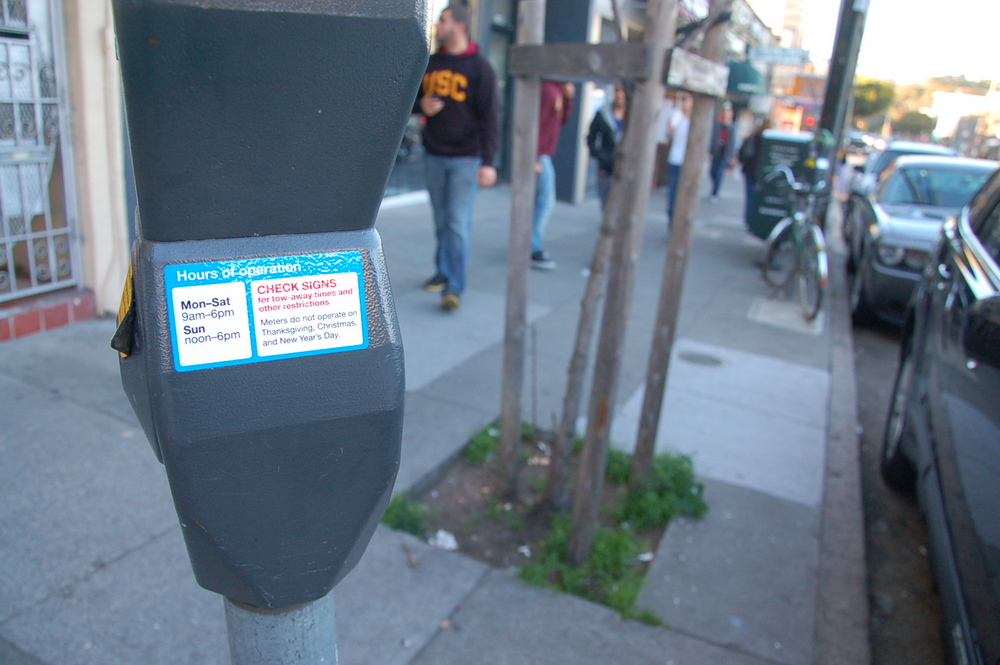The Board of Supervisors voted 9-2 yesterday to reject an appeal, filed by sustainable transportation advocates, to require environmental review of the SFMTA's repeal of Sunday parking meters. Although the vote was not on the merits of Sunday parking metering, but rather whether the SFMTA violated the California Environmental Quality Act in repealing it, the hearing shed some more light on the political stances of some supervisors.
All supervisors, except John Avalos and Eric Mar, voted to reject the appeal. Supervisor Scott Wiener argued that, even if supervisors opposed removing Sunday meters and the SFMTA governance structure that allowed Mayor Ed Lee to push it through, CEQA must be applied consistently. "I have enormous respect for the appellants in this case," he said. "I work with them regularly in our joint quest to adequately fund our public transportation system and have smart transportation policy in San Francisco... but this is about whether the SFMTA correctly applied a CEQA exemption."
Wiener has been a proponent of reforming CEQA to curb frivolous appeals, which are often used by opponents to delay even environmentally beneficial projects, like bike lanes. Since the Sunday meter repeal was approved as part of the SFMTA's budget as a whole, and budget adjustments have a statutory exemption from CEQA review, Wiener argued that upholding the appeal would mean it would have to apply to other changes, like the free Muni for low-income youth program.
"Rejecting a correctly applied statuary exemption because one might disagree with the underlying policy decision, and trying to force it into a higher level of CEQA review, has profound implications not just for this issue but for the many, many other situations that MTA and other agencies deal with -- situations [like] fees, fines and fares," Wiener said.
But the appellants, representing Livable City and the SF Transit Riders Union, disagreed. They argued that removing Sunday meters comes with a particular set of impacts, particularly increased traffic congestion, since the SFMTA's own studies showed benefits such as cutting in half the time that drivers take to find a commercial parking spot.
"If you've listened to the SFMTA over the past decade as to why they manage parking, why we need variable pricing, and Sunday and evening meters, they say it's not about revenue. They say it's about intelligent management of parking. It's about reducing cruising for parking in neighborhoods," said Livable City Executive Director Tom Radulovich. "Now SFMTA is saying well, no, this is purely budgetary."
Walk SF Executive Director Nicole Schneider added that when distracted drivers "are circling, looking for parking without a metered system, that leads to pedestrian injuries. The more traffic we have circling, the more likelihood there is for collisions and frustration on behalf of drivers."
"A CEQA budget exemption should not be used to mask political decisions," said Cynthia Crews of the League of Pissed Off Voters.
Supervisor Mar agreed, citing a January Streetsblog article which pointed out that, based on the SFMTA's December report, repealing parking meters on Sundays would double the average time drivers take to find a commercial parking spot, reduce turnover for businesses by at least 20 percent, cut the availability of commercial parking in half, and reduce the occupancy of underutilized parking garages by 13 percent during the hours that the meters are in effect.
"Rolling it back is not a step towards a transit-first city," said Mar. I feel like it's a step towards a car-dominant city."
"It's a bad precedent to hide the political elephant in the room," added Mar, "which is a mayoral decision to roll back a policy that was to protect the environment, and many important benefits, without discussion and without a thorough review."
Yesterday's hearing offered an enticing opportunity for Mayor Lee's purported public revolt against Sunday meters to manifest itself. But just six people spoke during the opponents' turn to testify, and three of them didn't even talk about parking meters.
Of the three who did speak to the Sunday meter issue, one was Christopher Bowman of the Log Cabin Republicans. Bowman was interrupted by Board President David Chiu, who reminded him that he was not allowed to use the public comment period to "electioneer" for his ballot iniative to "restore balance" for cars in San Francisco. The other two were Mari Eliza, an anti-parking meter activist, and a woman who said she just happened to be at the hearing and supported free parking for churchgoers.
Of the other three speakers, one man declared that the entire discussion was moot, because soon "we're all going to be riding in Google's robo-cabs." Another was a taxi driver, who regularly speaks at unrelated hearings to call for stricter regulation of Lyft and Uber. The third said he was a new resident, and demanded clarification on his rights to ride nude on Muni.
Supervisor Avalos said he voted to uphold the appeal, since removing Sunday meters was "reducing the amount of money, and preventing the MTA from meeting its operational needs, which the [CEQA] exemption was built for."
Supervisor David Campos didn't state a stance on Sunday meters or the appeal, though he voted to reject it. But he argued that the root of the problem was the level of control that the mayor has over the SFMTA Board of Directors, since he appoints all of its seats.
"I think the way this matter was handled by the SFMTA, respectfully, is not something anyone should be happy with," said Campos. "We have a budget system that is essentially run by decisions made in the Mayor’s Office."
Wiener acknowledged that "the MTA is an imperfect agency, but transparent," and argued that "systematically, the elected officials in this building have not prioritized transit funding."
"There are times when it is tempting... if you disagree on a substantive policy level, to say we're gonna grant the CEQA appeal," said Wiener. But doing so "would set a very, very broad precedent."





